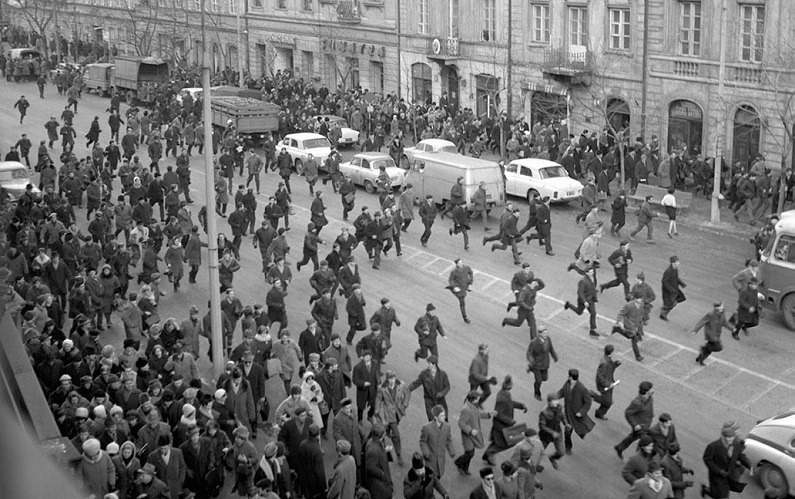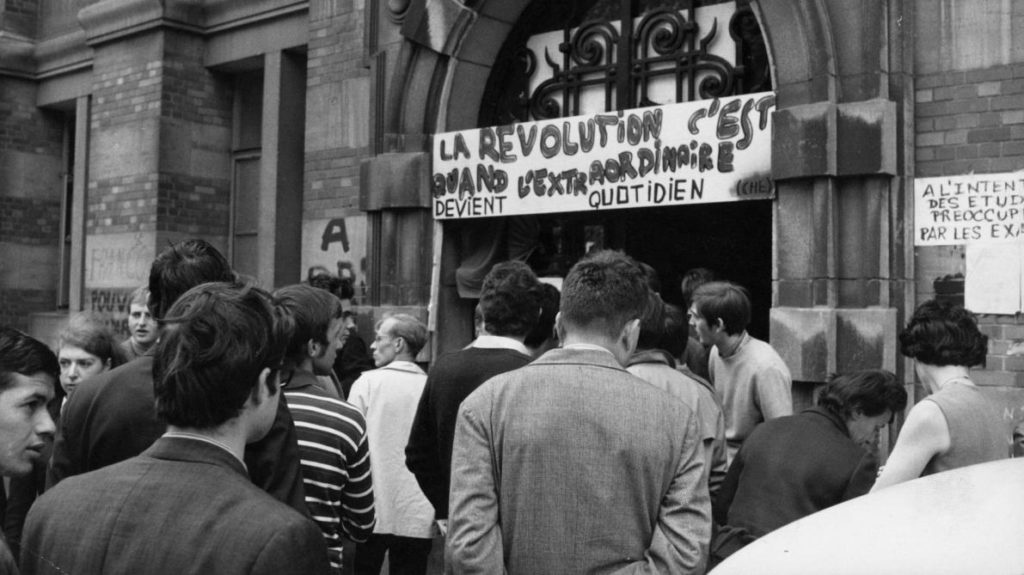All over Europe, events are being organized to celebrate the fiftieth anniversary of the eventful spring and summer months of 1968. Fifty years ago, a spirit of freedom – so our collective memory tells us – spread across the world in general and the European continent, in particular.
Massive strikes and student revolts aimed to free society from the shackles of the established post-war petit-bourgeois order. The historic significance of these events cannot be denied. But a single-minded glorification of the past is seldom justified, and 1968 is no exception in this regard. As a matter of fact, 1968 is perhaps as much a year of freedoms lost as of freedoms won.
In politics, sexuality, economy, musical tastes; in fact in all important matters that concern people’s private lives, young people felt the need to revolt against the world their parents had created.
In Flanders, one of the main focal points of this revolt was regional autonomy and the valuation of the Dutch language. In Leuven, the students successfully fought the French dominance at the Catholic University. Also in Brussels, the once bilingual university was split into a separate Flemish Free University and the Université Libre de Bruxelles.
The reign of freedom
Though certain achievements deserve praise, historic facts don’t warrant the description of 1968 as the year that freedom reigned, or as the year that everything seemed possible. Many arbitrary acts of violence were committed by those waving the banners of freedom, while simultaneously writing the names of Mao and Marx on the walls, seemingly unaware of the irony.
These acts of violence must also have their place in our collective memory. Nor should we forget that in many places the fight for freedom was ended by brutal repression and bloodshed. If you think of the violence that ended the Prague Spring or that which ended the student protests in Mexico, you’ll quickly realize that 1968 was a year in which many things became impossible, not least, the liberation from communism in Eastern Europe.
A moral crisis
Consider what happened in Poland that year. In March 1968, students, intellectuals and those longing for real liberties took part in major protests against the communist government. The government didn’t merely respond by crushing the dissident movement; it also adopted anti-Semitic measures that have no parallel in post-war European history. These events are commonly referred to as the 1968 Polish political crisis, which is an unfortunate euphemism, since more than anything else, the 1968 crisis in Poland was a moral one.
Exile and exodus
When Wladyslaw Gomulka was named first secretary of the communist party in Poland in 1956, he came with the promise of liberalization and economic reform. But from the late fifties onwards, his regime became increasingly oppressive and anti-Semitic. Jews were systematically being bullied, harassed, fired and threatened, in a campaign waged by General Mieczyslaw Moczar, then minister of internal affairs.
This campaign culminated in 1968 in the forced exodus of thousands of Polish Jews. It is estimated that between 13,000 and 30,000 Jews and non-Jewish intellectuals and dissidents who sought reform were forced into exile. Among them were sociologist Zygmunt Bauman, and philosopher Leszek Kolakowski.

Protesters run away from police outside the University of Warsaw, March 1968.
Kolakowski initially left Poland for Paris. He was there when the student protests erupted, and he was quite astonished by the fact that so many students and Western intellectuals shamelessly raved about communism, while knowing so little about it. How could they praise an ideology and believe it to be liberating, when the slightest acquaintance with the practice would show how oppressive it was?
The real face of communism
In the late forties and early fifties, as Poland struggled to recover from its terrible fate during the Second World War, Kolakowski had supported communism. But when he saw what it actually means, he increasingly opposed and criticized the regime and its ideology. He paid a huge price for his quest for real freedoms: he lost his home and his home country.
But reality and the real face of communism were not what the soixante-huitards were interested in. Sartre, one of their leading intellectuals, was informed about how oppressive life behind the iron curtain was. He knew how artists perished in the Soviet-Union. But that didn’t stop him from praising the Soviet-Union and communism.
Selective memory
Our collective memory is strikingly selective when it comes to 1968. It is quite amazing, if not completely shocking to know that you can organize a large-scale anti-Semitic campaign, expel thousands of Jews and intellectuals fro of one Europe’s largest countries, and fifty years later the world won’t even bother to remember. One of the darkest pages in the book of post-war European history was written then. Yet so many seem to be blinded by the light of revolution that they fail to remember the darkness.
Evil imagination
There is no reason to believe that the past contains the simple solutions to the complex problems we face today. Yet many believe we need to reconnect to the ideals of the soixante-huitards, in particular to their famous creed imagination au pouvoir.
International conferences are being held about the importance of this creed today. The main topic of the yearly Feast of Philosophy in Leuven and of the Day of Philosophy both in Flanders and in Holland is exactly this: power to imagination. It is important to remind ourselves that imagination is not a good in itself. A great deal of misery can result fro imagination. Bad, even thoroughly evil people can be highly inventive and imaginative. Imagination is only good, when used for the good.
A sense of reality
If there is one thing politics needs nowadays, I would argue it is a proper sense of reality rather than more imagination. All over the world, there are people in power who are quite imaginative, and as a result, are doing things that defy all imagination.
They imagine you solve a problem by simply building a wall around it. They imagine real facts can be replaced by alternative truths. They imagine elections can be manipulated without anyone noticing it. They imagine climate change to be the product of scientists suffering fro too much imagination.
In the face of this, common sense stands out as an indispensable virtue of a good politician and an engaged citizen. Common sense is the compass without which all imagination is aimless. Unfortunately, one thing history tells us – 1968 as much as 2018 and any other year – is that common sense realities are less exciting, and less likely to recruit an enthusiastic following than intoxicating fictions.
By Alicja Gescinska


